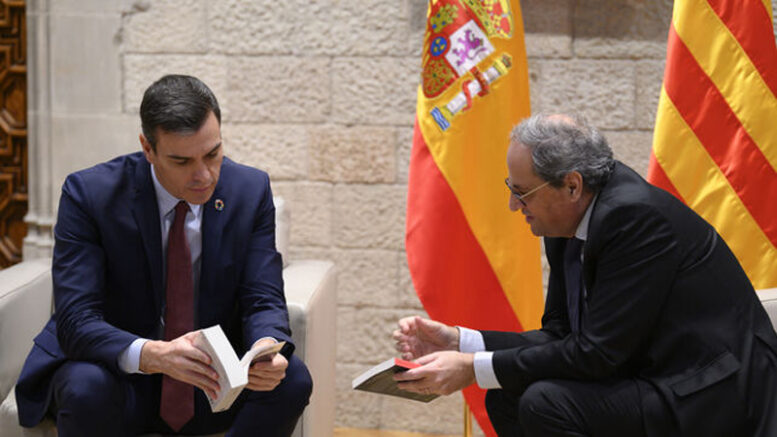The government of President Pedro Sánchez and the leadership of Catalonia’s two main pro-independence parties appear to be jockeying for position in the run-up to regional Catalan elections this Spring, each using the anticipated mesa de dialogo negotiations to resolve the political conflict in Catalonia to try and gain the upper hand on the other.
On Thursday, the Sánchez government and the office of Catalan regional President Quim Torra agreed to hold the first session of the mesa de dialogo on Wednesday 26th February, just three days before a large pro-independence rally headlined by Torra’s predecessor and the driving force behind the Junts per Catalunya (JxCAT) party, Carles Puigdemont, set to take place just 30 km from Spain’s northern border in the French city of Perpignan.
The setting of a date of the first session of talks had appeared to be stalled, following a surprise demand from Torra after a meeting with Sánchez in Barcelona earlier this month, with Torra calling for an international mediator to be present at the talks.
Catalonia’s Esquerra Republican (ERC) party, which negotiated the establishment of a mesa de dialogo as part of its agreement for abstaining on a congressional vote that brought Sánchez to power in January, had expressed frustration over the stalled talks and demanded that they take place before the end of February. Torra’s JxCAT party, meanwhile, continued to insist on the mediator as a prerequisite and called for the talks to begin no sooner than early March.
► News Sources: El Diario, La Vanguardia and El Periódico …
Sánchez responded to the ERC insistence this week, saying the Spanish government is ready to hold the talks immediately and proposing Monday as the date for the first meeting of negotiators. Torra’s government immediately knocked back the Sánchez proposal, calling it an attempt to unilaterally impose a timetable on the Catalans, but on Thursday Torra offered five alternative dates and the two sides settled on Wednesday the 26th for the first meeting.
The path to initiating the talks has been tortuous, in part because the principal Catalan parties are each jockeying for credit as the party ostensibly responsible for forcing the Sánchez government to negotiate a resolution to the political conflict over Catalonia’s independence from Spain.
To claim majority support from the roughly 50 percent of the Catalan voting population that is pro-independence, both JxCAT and the ERC hope to validate with voters at the ballot box their claim to having been most successful in moving negotiations on the political crisis in Catalonia forward.
The Sánchez government is meanwhile clearly playing for time, hoping that the talks will have barely gotten underway before they are overshadowed by the campaign for the Catalan regional elections, the precise date of which has yet to be announced by Torra.
The outcome of those elections will determine whether the Socialists’ future negotiating counterpart in Catalonia is the more hard-line separatists of Torra’s JxCAT party or the more pragmatic, centre-left pro-independence ERC, with whom the Socialists’ PSC affiliate party in Catalonia has governed at the regional level in the past.
► Click to read more news about Catalonia …
Check out more news from Spain about:
► Animal Welfare ► Corruption/Transparency ► Discrimination ► Education ► Elections ► Environment & Sustainability ► Fair Trade & Development Aid ► Healthcare ► Historical Memory ► Housing & Homelessness ► Human Rights ► Labour & Unemployment ► LGBT+ ► Politics ► Poverty ► Refugees & Migration ► Technology & Social Enterprise ► War & Peace ► Women’s Rights

All images at ProgressiveSpain.com are the copyright of their respective authors/owners and are reproduced here for non-commercial, journalistic purposes in accordance with Fair Use doctrine. All other content is Copyright © 2015-2020 ProgressiveSpain.com and is licensed under a Creative Commons Attribution-NonCommercial-ShareAlike 4.0 International License.

